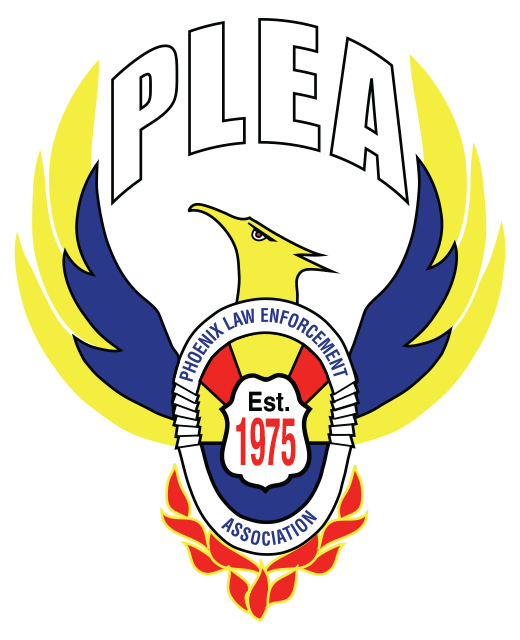The Phoenix Law Enforcement Association, PLEA, was founded in 1975 as “The Professional Association of Phoenix Police Officers” and has served as the sole certified bargaining unit for rank and file Phoenix Police Officers, known by the City as “Unit 4” for over 44 years. PLEA negotiates the wages, benefits, and working conditions for approximately 2500 Unit 4 members and provides representation regarding discipline and grievances, and legal representation for members involved in use of force incidents like officer-involved shootings.
Amid the aftermath of the incident which occurred on May 27, 2019 and subsequent release of cellphone video of Phoenix Police Officers during their contact with the occupants of a Hyundai Santa Fe wanted in connection with an alleged shoplifting which occurred at the Family Dollar Store located at 1630 North 36th Street, many individuals and organized groups are calling for immediate termination of the involved officers. At the City Council Meeting held on June 19, 2019, termination of the officers and the subject of implementing civilian oversight of the Phoenix Police Department, which would have power to subpoena witnesses and terminate officers came up.
First and foremost, police officers, like every citizen in the United States have Due Process rights and a presumption of innocence until proven guilty. In Arizona, all police officers have protection under the Peace Officer Bill of Rights contained in Arizona Revised Statutes 38-1101 through 38-1116 which includes:
- Officers are not subject to disciplinary actions except for just cause
- Officers may have representation during administrative investigations
- Officers must be notified in writing of the specific nature of the investigation
Sustained allegations of misconduct by Phoenix Police Officers are subject to disciplinary action which range from written reprimands to suspensions of up to 240 hours, and termination.
When a police officer is involved in a shooting, there are two separate, yet concurrent investigations which occur. A criminal investigation is conducted by the Phoenix Police Department’s Homicide Detail which is directly overseen by the Maricopa County Attorney’s Office. The County Attorney is an elected civilian position, and the Deputy County Attorneys who respond every officer-involved shooting are civilians. This portion of the investigation is to determine if the officer’s actions comport with Arizona Revised Statutes 13-409 and 13-410, which cover justification of use of force and use of deadly force in law enforcement. The Phoenix Police Department’s Professional Standards Bureau, PSB, or what most people would refer to as “Internal Affairs” conducts an administrative investigation to determine if the officer’s actions comport with Operations Orders 1.5 with regards to their use of force.
The Phoenix Police Department and the City of Phoenix have a history of civilian oversight and integration in the disciplinary process for years. Civilians currently sit on the following boards which are part of that process:
- Use of Force Boards, which make recommendations as to whether force used by an officer was in or out of policy as outlined in Phoenix Police Department Operations Orders 1.5 are chaired by an assistant police chief, and have a peer officer, a police commander, and 3 civilian members.
- Disciplinary Review Boards, which make recommendations as to the level of discipline an officer should receive for sustained allegations of violating Phoenix Police Department policies are chaired by an assistant police chief and have 2 peer officers, 2 police commanders, and 2 civilian members.
- The Civil Service Board, a five-member panel
composed entirely of civilians, hears cases where officers have appealed
discipline including termination.
- They can decide to allow the discipline or termination to stand as is
- They can decide to reduce the level of discipline
- They can override a termination and recommend reinstatement of an employee
As with any City process, there are questions about how such a panel would be convened and where would they get their authority to subpoena and terminate officers.
- Is this allowed under the City Charter?
- Is this allowed under State law?
- Who selects the individuals for these panels?
- Are there specific requirements or qualifications to be eligible for consideration?
In addition to these questions, what is most concerning about complete civilian oversight are qualifications members of these panels have to judge the actions of police officers including:
- Knowledge of Constitutional Law regarding law
enforcement contact, detention, and use of Force
- Terry v Ohio
- Tennessee v Garner
- Graham v. Connor
- Knowledge of Arizona Law
- ARS 13-409; Justification of Police Use of Force
- ARS 13-410; Justification of Police Use of Deadly Force
- ARS 38-1102; The Arizona Peace Officers Bill of Rights
- Knowledge of use of force including:
- Defensive and arrest tactics training
- Firearms training
- Definition of and being able to explain the term “de-escalation” and de-escalation protocols.
- Knowledge of Phoenix Police Department Policies,
including but not limited to
- Vehicle Operations
- Discipline Policy
- Use of Force
PLEA believes that this is a bad idea and we request your support in stopping this process before it begins and has major impact on how allegations of misconduct and use of force by Phoenix Police Officers will be handled in the future.
PLEA has always strived for fairness with regards to the Phoenix Police Department’s discipline policy; Sometimes fair is a written reprimand instead of a suspension. Sometimes fair is a suspension instead of a termination. Sometimes fair is being walked out the door and assisting with surrender of an AZ POST Certification when their conduct was such that it tarnished the reputation of ALL police officers. Police officers are drawn from the pool of humanity; none of them are perfect and all are subject to making mistakes and when they do, the discipline should be fair, firm and consistent.
